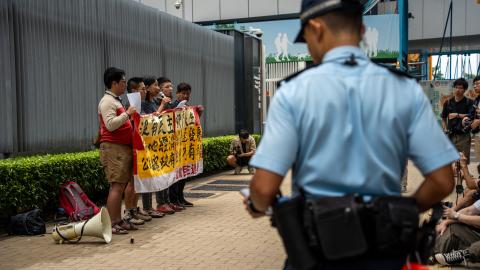Last month, the Chinese Communist Party and Hong Kong authorities — using Article 23 powers under the city-state’s mini-constitution, the Basic Law — struck yet another blow against freedom in Hong Kong by enacting a new “national security” law. The bill was enacted on March 22 and goes beyond the scope of the Beijing-imposed national security law passed in 2020 by adding five new categories of security crimes: treason, insurrection and sedition, theft of state secrets and espionage, external interference and sabotage activities.
The new security law will have a chilling effect on civil and political liberties in Hong Kong, especially for the rule of law, press freedom and religious freedom. The U.S. Congress and the White House should act now to hold the CCP and Hong Kong authorities accountable and stand with the people of Hong Kong.
More than anything else, the new security law intensifies the threat to the rule of law in Hong Kong. This is especially concerning for political prisoners and Hong Kongers standing trial, like Apple Daily newspaper founder Jimmy Lai, Joshua Wong and the Hong Kong 47 currently standing trial. The new law further broadens the city-state’s definition of national security. Legal experts and NGOs expressed concern over the law’s vague definition for crimes like “theft of state secrets,” “external interference” and “seditious intention.”
The new law also raises penalties for political offenses. Criticism of Hong Kong authorities and Beijing can now constitute sedition, a crime not covered by the 2020 security law, and the maximum penalty for sedition tripled from two years to seven years imprisonment, or 10 years if it involves coordination with “external forces.” Moreover, the new law prevents all those convicted of national security offenses from early release for good behavior, including those convicted before the bill passed.
There is no doubt that the purpose of the bill is to silence pro-democratic voices and persecute dissidents. One means of doing this is to crack down on the freedom of the press. Under the new law, journalists may be punished with a maximum seven-year imprisonment on the charge of “theft of state secretes and espionage” for obtaining information from leaked government sources or quoting foreign sources. Members of the public are also at risk of being charged with “collusion with external interference” simply for speaking with international media, as evident in the trial of Jimmy Lai.
On the same day lawmakers unanimously approved new amendments to the law, Radio Free Asia announced to employees that it will close its bureau in Hong Kong. With the new law, the Hong Kong government is doing “irrevocable damage to press freedom,” said the Hong Kong Journalists Association.
Additionally, the new law is likely to have severe implications for people of faith. Frances Hui of the Committee for Freedom in Hong Kong Foundation (CFHK) warns that the new law poses a direct threat the Sacrament of Confession for Catholics. Catholic priests, who are under religious obligations not to disclose what a parishioner shares in the context of confession, may now be sentenced to 14 years for refusing to violate the seal of confession.
A report by CFHK emphasizes that China proactively pressures groups to engage with mainland oversight bodies, steering them toward fidelity to the CCP and away from the international religious community. Now, the new law will clear the way for China and the pro-Beijing camp to persecute religious organizations that maintain relations with foreign organizations and believers on the count of “colluding with external interference.”
There are many communities in Hong Kong that will be worse off due to the new security law. The CCP and Hong Kong government’s latest move further solidifies Hong Kong’s fall from grace and should be met with clear opposition from the United States and the international community.
In fact, the punishment should fit the crime. The U.S., in particular, should issue targeted sanctions against individuals and entities responsible for the original national security law and the newer version. It should also revoke special privileges and immunities afforded to the Hong Kong Economic and Trade Offices, which serve as embassy-like bodies operating at the behest of the CCP. Finally, the U.S. should anticipate that additional individuals from Hong Kong will be in need of refugee relief and extend permanent safe haven in the form of Priority-2 refugee status.
Hong Kongers need American and global support now more than ever. It’s time for Congress and the executive branch to stand on the side of freedom and act.















